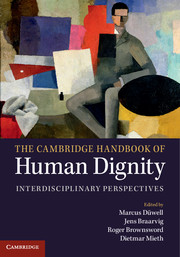Book contents
- Frontmatter
- Contents
- List of contributors
- Foreword
- Why a handbook on human dignity?
- Acknowledgments
- 1 Human dignity from a legal perspective
- 2 Human dignity: concepts, discussions, philosophical perspectives
- Part I Origins of the concept in European history
- Part II Beyond the scope of the European tradition
- 13 The concepts of human dignity in moral philosophies of indigenous peoples of the Americas
- 14 Human dignity in the Islamic world
- 15 Hinduism: the universal self in a class society
- 16 Buddhism: inner dignity and absolute altruism
- 17 Human dignity in traditional Chinese Confucianism
- 18 Dignity in traditional Chinese Daoism
- Part III Systematic conceptualization
- Part IV Legal implementation
- Part V Conflicts and violence
- Part VI Contexts of justice
- Part VII Biology and bioethics
- Appendix 1 Further reading
- Appendix 2 Universal Declaration of Human Rights
- Index
- References
18 - Dignity in traditional Chinese Daoism
from Part II - Beyond the scope of the European tradition
Published online by Cambridge University Press: 05 March 2015
- Frontmatter
- Contents
- List of contributors
- Foreword
- Why a handbook on human dignity?
- Acknowledgments
- 1 Human dignity from a legal perspective
- 2 Human dignity: concepts, discussions, philosophical perspectives
- Part I Origins of the concept in European history
- Part II Beyond the scope of the European tradition
- 13 The concepts of human dignity in moral philosophies of indigenous peoples of the Americas
- 14 Human dignity in the Islamic world
- 15 Hinduism: the universal self in a class society
- 16 Buddhism: inner dignity and absolute altruism
- 17 Human dignity in traditional Chinese Confucianism
- 18 Dignity in traditional Chinese Daoism
- Part III Systematic conceptualization
- Part IV Legal implementation
- Part V Conflicts and violence
- Part VI Contexts of justice
- Part VII Biology and bioethics
- Appendix 1 Further reading
- Appendix 2 Universal Declaration of Human Rights
- Index
- References
Summary
‘Dignity’ (尊严, zūn yán) is, in the contemporary Chinese language, both a foreignism and a native term. As a foreignism, many scholars conceive the main function of dignity to be the communication of modern European ideas of human dignity, especially that of Kantian philosophy, to contemporary China which is thought to lack such ideas. Thus, in the Ci-Hai (辞海, literally a ‘sea of terms’), one of the few comprehensive Chinese dictionaries, the second definition of this word is: ‘The recognition and affirmation of the moral and social value of an individual or a social organization; The acknowledgment of the value of human life as the most fundamental dignity of human beings’ (Ci-Hai 2000: 2300). The Ci-Hai mentions nothing of the Chinese tradition of the concept, as if it does not play a role in Chinese philosophy. This would be a misunderstanding: a notion of dignity is central in both Confucianism and Daoism. The Confucian concept of dignity is similar to the one we find in Kantian philosophy: dignity is understood as human dignity and strongly related to action. In the Daoist tradition, ‘dignity’ functions very differently, but this does not mean, I will suggest, that it is of no interest to our understanding of the concept. Quite the contrary: the Daoist conception of dignity could contribute to the global discussion of the concept precisely because it offers a different perspective.
I will first briefly attempt to outline the general features of the idea of Dao, and second discuss the substance and role of dignity in Daoism.
- Type
- Chapter
- Information
- The Cambridge Handbook of Human DignityInterdisciplinary Perspectives, pp. 182 - 188Publisher: Cambridge University PressPrint publication year: 2014



